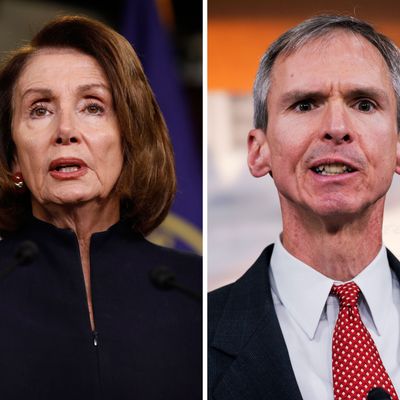
In today’s special congressional election in southwest Pennsylvania, Democrats are testing the value of a Big Tent Party in the candidacy of Conor Lamb, who has promised not to vote for Nancy Pelosi as party leader and is heterodox on a few other issues, notably gun regulation. But Lamb is running in what has been a solidly Republican district, one that Donald Trump carried by nearly 20 points in 2016. In next week’s Illinois primary (not a special election, but a regular midterm election) there is a Democratic House race that provides a different big tent test: to what extent should Democrats tolerate a right-leaning congressman in a solid blue district?
Representative Dan Lipinski is in many respects the kind of old-school Chicago Democrat who was fairly common when his father Bill (who basically deeded the seat to his son) was elected to Congress in 1982: a pro-life labor guy who’s not really liberal in any meaningful sense and reflects the occasionally illiberal views of Catholic ethnic constituents along with Chicago business interests. His district includes the Irish ethnic neighborhood from whence the Daley family emerged to dominate the city. But it’s also been evolving, with a sizable Hispanic population and a new strain of liberal politics: Bernie Sanders carried Lipinski’s district in the 2016 primaries. And the third-congressional district is in no sense the kind of marginal district where distinctively moderate Democrats are needed to win elections: Both Hillary Clinton in 2016 and Barack Obama in 2008 and 2012 carried it by double digits. Yet Lipinski has increasingly aggravated liberals, not only with his support of abortion restrictions and his opposition to protections for LGBTQ folk, but with votes in 2010 against the Affordable Care Act and the Dream Act.
And so, inevitably, a serious left-bent primary challenge to Lipinski has arisen in the form of Marie Newman, a marketing consultant and anti-bullying activist who not only criticizes the incumbent’s heresies but also champions the standard progressive causes of single-payer health care and a big minimum-wage increase. Unsurprisingly, she’s been endorsed by Bernie Sanders. But two of Lipinski’s Chicago colleagues in the House, Jan Schakowsky and Luis Gutiérrez, have also endorsed Newman. Yes, these two are both stalwart members of the Congressional Progressive Caucus. But it still defies protocol to, as Politico put it in a not terribly objective comment, “plung[e] a knife into the back of a neighboring Chicago-area congressman whom they’d served with in Congress for over a decade.”
As signs grow that Lipinski is in real trouble (a survey last week from Public Policy Polling for the pro-choice group NARAL showed the incumbent leading Newman by a slim two points), the House Democratic leadership has come to his aid, as The Hill reports:
House Minority Leader Nancy Pelosi (D-Calif.), Minority Whip Steny Hoyer (D-Md.) and Rep. Joseph Crowley (N.Y.), chairman of the House Democratic Caucus, have all come out vocally in recent days to throw their weight behind the incumbent.
After some alleged balkiness, the House Democratic Caucus’s campaign arm, the Democratic Congressional Campaign Committee is also helping Lipinski.
In most respects this is a dog-bites-candidate story: Pelosi and her leadership, like their predecessors from time immemorial, almost invariably support Democratic incumbents regardless of ideology. But Lipinski definitely puts a strain on that tradition:
The endorsement from Pelosi is particularly notable. She was the leading force behind the passage of ObamaCare in the House, has been a life-long champion of LGBT rights and access to abortion, the Dream Act was among her last victories as House Speaker, and Lipinski has regularly voted against her in the lower chamber’s biennial leadership races.
Tribal loyalty aside, the case for keeping Lipinski around really boils down to the belief that it’s helpful to Democrats in more conservative parts of the country to be able to point to an anti-abortion and (relatively) anti-immigrant congressman as a symbol of party tolerance. Personally, I doubt the swing voters of Mississippi or Nebraska are really watching the primary in Illinois closely by way of defining their perceptions of the Donkey Party, and even if they are, you have to wonder why the Democrats of the third district must be the ones to sacrifice their own representation to national big tent symbolism. Lipinski himself warns that Newman represents an intolerant “tea party of the left.” But as New York’s Eric Levitz points out, “Lipinski hasn’t comported himself as a ‘moderate’ Democrat, so much as a conservative one.”
In the end, if Lipinski survives it will be due less to national party support than to very local AFL-CIO support. But labor’s not entirely backing its dynastic Chicago ally: SEIU has endorsed Newman.
Again, either candidate is a sure winner in November. But if Lipinski does go down, expect Republicans from Maine to Hawaii to echo his “tea party of the left” accusation, though for obvious reasons they will probably choose a different terminology.






























